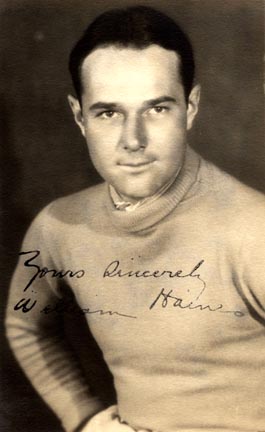Order a reprint
of this photo!
Click here for ordering instructions
 William Haines
Born Jan. 1, 1900, in Staunton, Va. Born in a well-to-do
family, Haines was somewhat of a rebel in his youth and ran away
from home at age 14. He worked in a powder factory, helped run
a dance hall, worked in a rubber company and worked in a dry goods
store. In 1920, he was in New York working part of this time as
a bookkeeper. He entered a "New Faces" contest which
he and Eleanor Boardman won. In 1922, he was sent to California
to make films for the Goldwyn studio. He made five films for Goldwyn,
one of which was the Elinor Glyn sexy romance "Three Weeks,"
before being borrowed by Columbia for his first starring role
in "The Midnight Express." Haines was also used by Universal
prior to the merging of Goldwyn with Metro to form Metro-Goldwyn-Mayer.
Haines' star began to rise rapidly with good roles in first-class
movies such as "Wine of Youth" (1924) with Eleanor Boardman,
"So This is Marriage?" (1924) with Eleanor Boardman,
"Tower of Lies" (1925) with Lon Chaney, and "Little
Annie Rooney" (1925) with Mary Pickford. Finally, in 1926,
he was starred in "Brown of Harvard" as a breezy, arrogant
college athlete, the type of role he seemed to become identified
with and portrayed so well. "Tell It to the Marines"
(1926) was a Lon Chaney picture all the way around, but Haines,
in the second lead as a young recruit who gets his come-uppance,
did an outstanding job. By the way, this picture, once again,
teamed him with Eleanor Boardman. "Slide, Kelly, Slide"
(1927) cashed in on the baseball craze, and "West Point"
(1928) which cast him as an arrogant cadet who changes his ways.
One of his best roles was actually in support of Marion Davies
in "Show People" (1928) in which there was less of the
traditional arrogant portrayal and, instead, portraying the suppportive
boyfriend to Davies. His first talkie was "Navy Blues"
(1929), one of five films he made with Anita Page. The type of
arrogant, brash, self-confident character that Haines has cashed
in on so well didn't work as well in sound films, and he made
his last film in 1934 before turning to interior decorating. It
is well known that Haines was a homosexual, and he and his partner,
Jimmie Shields, lived together from the twenties until Haines
death March 6, 1974.
Selected films of this star available for viewing:
Little Annie Rooney (1925)
Brown of Harvard (1926)
Tell
It To the Marines (1926)
Show People (1928)
William Haines
Born Jan. 1, 1900, in Staunton, Va. Born in a well-to-do
family, Haines was somewhat of a rebel in his youth and ran away
from home at age 14. He worked in a powder factory, helped run
a dance hall, worked in a rubber company and worked in a dry goods
store. In 1920, he was in New York working part of this time as
a bookkeeper. He entered a "New Faces" contest which
he and Eleanor Boardman won. In 1922, he was sent to California
to make films for the Goldwyn studio. He made five films for Goldwyn,
one of which was the Elinor Glyn sexy romance "Three Weeks,"
before being borrowed by Columbia for his first starring role
in "The Midnight Express." Haines was also used by Universal
prior to the merging of Goldwyn with Metro to form Metro-Goldwyn-Mayer.
Haines' star began to rise rapidly with good roles in first-class
movies such as "Wine of Youth" (1924) with Eleanor Boardman,
"So This is Marriage?" (1924) with Eleanor Boardman,
"Tower of Lies" (1925) with Lon Chaney, and "Little
Annie Rooney" (1925) with Mary Pickford. Finally, in 1926,
he was starred in "Brown of Harvard" as a breezy, arrogant
college athlete, the type of role he seemed to become identified
with and portrayed so well. "Tell It to the Marines"
(1926) was a Lon Chaney picture all the way around, but Haines,
in the second lead as a young recruit who gets his come-uppance,
did an outstanding job. By the way, this picture, once again,
teamed him with Eleanor Boardman. "Slide, Kelly, Slide"
(1927) cashed in on the baseball craze, and "West Point"
(1928) which cast him as an arrogant cadet who changes his ways.
One of his best roles was actually in support of Marion Davies
in "Show People" (1928) in which there was less of the
traditional arrogant portrayal and, instead, portraying the suppportive
boyfriend to Davies. His first talkie was "Navy Blues"
(1929), one of five films he made with Anita Page. The type of
arrogant, brash, self-confident character that Haines has cashed
in on so well didn't work as well in sound films, and he made
his last film in 1934 before turning to interior decorating. It
is well known that Haines was a homosexual, and he and his partner,
Jimmie Shields, lived together from the twenties until Haines
death March 6, 1974.
Selected films of this star available for viewing:
Little Annie Rooney (1925)
Brown of Harvard (1926)
Tell
It To the Marines (1926)
Show People (1928)
Return to photos page

